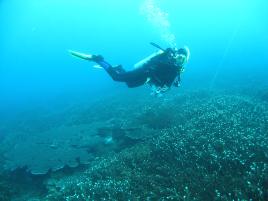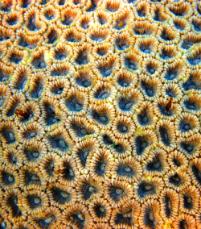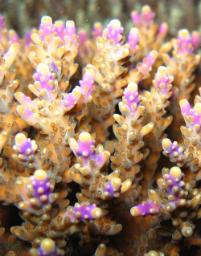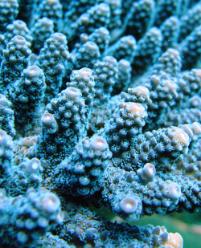Keppel Reefs Hide Amazing Coral Species Richness
Published on 02 October, 2009
Coral communities of the Keppel Islands have historically been considered low in species diversity. Not so, says CQUniversity researcher, Dr Alison Jones, who has recently been conducting fine-scale mapping of the reefs in the region as part of the Caring for Our Country program.
Of the 12 sites already surveyed for coral diversity, three sites stand out as having above average coral species richness. "These are, surprisingly, Passage Rocks, Humpy Island and Outer Rock" says Dr Jones. Humpy Island has an astounding 70 species of hard corals. The site with the second highest diversity is Passage Rocks with 49 species, closely followed by Outer Rock with 48 species listed so far... 
Keppel outer reef
‘We are adding to these species lists every time we go out diving and snorkelling'. Dr Jones leads the Caring for Our Country community monitoring program ‘Head Under Water' which is sponsored by the Fitzroy Basin Association. Members of the community who are involved in the program are learning to identify corals by the morphology.
‘The species richness was last studied in 1989 when Robert van Woesik described the reefs as having ‘relatively low hard and soft coral diversity'. "We are beginning to see a new picture of coral species richness for the Keppels with these recent surveys. Van Woesik did not survey the outer reefs as he was mainly interested in the inshore reefs'... 
We've found amazing diversity at reefs that are not high in coral cover. These marginal, deeper fringing reef habitats are not typically considered of great conservation value or tourism value because of the low coral cover but, their species richness is a different matter. Reefs which are low in coral cover, also usually have higher species numbers, making them even more important to protect. For instance, a tiny patch of reef near the mouth of Leekes Creek has 37 coral species in an area of less than 1000 m2. The quality of water entering Keppel Bay and flowing from the islands is of paramount importance because any process that impacts water quality will also affect how corals grow and regenerate after disturbance like a bleaching event... 
Members of the public can be involved in the community reef monitoring program by contacting Alison by email at a.jones@cqu.edu.au. A talk and photographic expose on the corals of the Keppel Islands will be conducted at the Capricorn Conservation Council Hut on 21st October 2009. Contact CCC on 49278644 or email ccc@cqnet.com.au for more details... 

